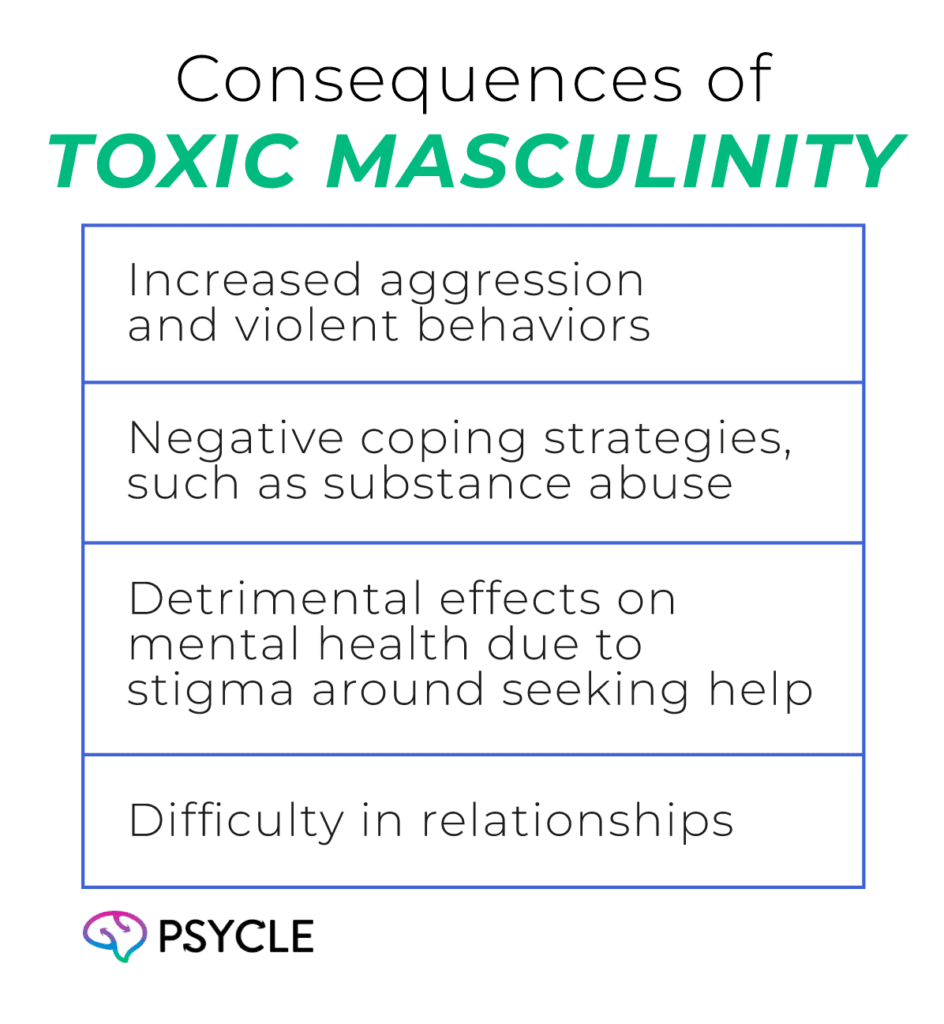It’s a predominant truth in Western countries that men are generally taught to express their anger, hide vulnerability, and adhere to gender roles that champion power and control. However, vulnerable emotions are part of the human experience.
When men are raised to continuously measure themselves against socially prescribed rules about what it means to “be a man,” they can fall into a cycle of hostility and aggression that can be damaging to their mental health.
Toxic masculinity is one manifestation of this problem, and understanding its impact is crucial for promoting men’s well-being and addressing the unique challenges they face.
Key Takeaways
- Toxic masculinity harms men’s mental health by stifling emotions and discouraging help-seeking.
- Men facing toxic masculinity may have a higher risk of mental health challenges, such as depression and suicidal thoughts.
- Challenging societal norms and promoting healthy masculinity is essential for improving men’s mental well-being.
What is Toxic Masculinity?
Toxic masculinity refers to the need to aggressively compete with and dominate others. It’s associated with misogynistic and homophobic attitudes, an adherence to masculine gender norms, and the devaluation of women. First coined in the 1980s, the term “toxic masculinity” has experienced a resurgence in the past decade with the rise of a new wave of feminism, and it has shaped conversations about cultural touchstones ranging from Trumpism to the #metoo movement.
Toxic masculinity is associated with the following traits:
- Extreme competition and greed
- Lack of consideration for the experiences and feelings of others
- Strong need to dominate and control others
- Incapacity to nurture
- Dread of dependency
- Readiness to resort to violence
- Stigmatization and subjugation of women, gay men, and men who exhibit feminine characteristics
In reality, there are many different forms of masculinity that do not match the societal “norm.” Toxic masculinity is not the same as masculine identity. However, it can perpetuate the risk factors that negatively impact men’s mental health—namely, emotion suppression, stigma around seeking help, and an increased risk of aggression.
The Harmful Effects of Emotion Suppression
Toxic masculinity places immense pressure on men to conform to societal expectations, often resulting in the suppression of vulnerable emotions. However, emotion suppression deprives men of the opportunity to express their feelings and seek emotional support when needed.
As a result, men may internalize their distress, causing further psychological distress and potential long-term damage to their mental well-being.
Studies have shown that emotional suppression can lead to a range of health concerns, including an increased risk of early death, stress, anxiety, and depression. It is crucial to recognize that emotions are a natural part of the human experience, regardless of gender.
Creating an environment that encourages emotional expression and provides support for men to openly discuss their feelings is essential for fostering mental well-being and challenging toxic masculinity.
Stigma Around Seeking Help
Toxic masculinity perpetuates the help-seeking stigma surrounding men’s mental health. The societal expectations imposed on men create a narrative that seeking support is a sign of weakness, undermining their ability to reach out for assistance.
Men may feel pressure to adhere to traditional masculine ideals of self-reliance, resilience, and emotional stoicism. As a result, many men choose to suffer in silence rather than seek the help they need.
The problem is that mental illness among men is a serious public health concern. In comparison to women, men are less likely to seek help and more likely to turn to dangerous, unhealthy behaviors in light of poor mental health.
Depression and suicide are ranked as a leading cause of death among men, and men die by suicide at a rate four times higher than women. Approximately 62,000 men die due to alcohol-related causes per year, in comparison to 26,000 women. And men are two to three times more likely to misuse drugs than are women.
Impact on Relationships
Toxic masculinity can have a significant impact on relationships, creating barriers to open communication and emotional intimacy. Men who adhere to societal expectations of masculinity often struggle to express their feelings and connect with their partners, leading to conflict and dissatisfaction.
These issues can contribute to relationship conflicts and a sense of dissatisfaction for both men and their partners. Without open and honest communication, couples may struggle to resolve issues and build a strong foundation of trust and understanding.
Increased Risk of Aggression
Toxic masculinity perpetuates societal expectations that men should be tough and dominant. This pressure begins with the sentiment that “boys will be boys,” encouraging adolescents to play rough and express their aggression—but not their vulnerability.
Adherence to these norms may lead to issues with interpersonal violence by placing men in an aggressive state, especially in situations that threaten their self-perceived masculine identity.
A supportive and nurturing environment that encourages emotional expression and empathy can help break the cycle of aggression linked to toxic masculinity. Programs that promote healthy masculinity and address the underlying causes of aggression, such as anger management workshops and therapy, can aid in reducing aggression risks and promoting mental well-being in men.

Higher Suicide Risk
Men are significantly more likely to die of suicide than are women. In 2022, approximately 39,000 men died in the United States by suicide, in comparison to 10,194 women, according to the CDC.
One key element in this disparity is the stigma associated with mental health and the lack of male support systems. Toxic masculinity, with its rigid expectations and suppression of emotions, makes it challenging for men to seek help when experiencing suicidal thoughts or depression.
When society dictates that men should be strong, independent, and in control at all times, it creates an environment where seeking help is seen as a sign of weakness. This can prevent men from reaching out and accessing the support they desperately need.
It is crucial to break down the barriers that prevent men from seeking help for their mental health. By promoting open conversations about suicide risk, toxic masculinity, and men’s mental health, we can create an environment that encourages men to ask for help without fear of judgment or shame.
If you or someone you know is experiencing a mental health crisis, contact the National Suicide Prevention Lifeline by dialing or texting 988.
Breaking the Cycle
To counteract the harmful effects of toxic masculinity on men’s mental health, creating supportive environments that encourage emotional expression, empathy, and vulnerability is crucial. These environments play a vital role in providing men with the opportunity to break free from the constraints of toxic masculinity and prioritize their mental well-being.
One way to promote supportive environments is through education and awareness campaigns. By raising awareness about the negative impact of toxic masculinity on mental health, we can help break down societal stereotypes and promote healthier behaviors and attitudes.
Education can empower individuals to challenge harmful norms and embrace more inclusive and compassionate ideas of masculinity.
Another powerful tool for creating supportive environments is the promotion of positive role models. Positive male role models who embody healthy masculinity can serve as inspiration for others, showing that it is possible to prioritize mental health, engage in open communication, and foster supportive relationships.
Supportive environments also extend beyond personal relationships and can be fostered in workplaces, educational institutions, and community settings.
By implementing policies that promote mental health, offering resources such as counseling services, and encouraging a culture of acceptance and support, organizations can create an environment where men feel safe to address their mental health concerns.
Furthermore, destigmatizing help-seeking behavior is essential in supportive environments. Men should feel empowered to seek professional help and engage in therapy without fear of judgment or a loss of masculinity.
Providing accessible mental health resources and normalizing the act of seeking assistance can significantly contribute to the overall well-being of men.
Promoting Mental Wellbeing in Men
To promote mental well-being in men, it is crucial to address the root causes of toxic masculinity and provide tailored resources and support. Men’s unique needs and experiences should be taken into consideration to effectively tackle the challenges they face in relation to their mental health.
Therapy and Counseling
Therapy and counseling can play a key role in supporting men’s mental well-being. By providing a safe and non-judgmental space, mental health professionals can help men explore their emotions, develop healthy coping mechanisms, and gain valuable insights into their experiences. Therapeutic interventions can assist men in challenging societal expectations and cultivating a more balanced sense of self.
Support Groups
Support groups offer men the opportunity to connect with others who have had similar experiences and share common struggles. Being part of a supportive community enables individuals to feel heard, validated, and understood. By providing a platform for open and honest conversations, support groups can help men break free from the constraints of toxic masculinity and foster a sense of belonging.
Targeted Interventions
Targeted interventions that specifically address men’s mental health can be highly effective in promoting well-being. Educational programs and initiatives that challenge toxic masculinity and promote healthy coping strategies are essential in empowering men to take control of their mental health. By encouraging self-reflection, emotional intelligence, and effective communication, targeted interventions can help reshape societal norms and redefine masculinity.
Building Resilience
Building resilience is a crucial aspect of promoting mental well-being in men. Encouraging men to develop healthy coping mechanisms, such as regular exercise, stress management techniques, and self-care practices, can improve their ability to navigate challenges and maintain positive mental health.
Encouraging Help-Seeking
Toxic masculinity often discourages help-seeking, leading men to suffer in silence. Destigmatizing mental health issues and promoting a culture of seeking support is essential. Open and honest conversations about mental well-being, public awareness campaigns, and accessible resources can help men feel more comfortable seeking help when needed.
Promoting mental well-being in men requires a multifaceted approach that goes beyond individual efforts. It requires society as a whole to challenge the harmful norms of toxic masculinity and create an environment conducive to open discussions, empathy, and support.
The Bottom Line
Toxic masculinity has a profound impact on men’s mental health. Societal expectations and norms that enforce the suppression of emotions, discourage help-seeking, and perpetuate aggression risk contribute to a higher suicide rate among men. The consequences of toxic masculinity are far-reaching, causing relationship issues and limiting men’s ability to seek appropriate support.
It is crucial to challenge these harmful norms and promote healthy masculinity. By fostering open dialogue, destigmatizing help-seeking, and providing accessible mental health resources, we can break the cycle and improve men’s mental well-being. Creating supportive environments that encourage emotional expression, empathy, and vulnerability is key to countering the damaging effects of toxic masculinity.
FAQs
How Does Toxic Masculinity Affect Men’s Mental Health?
Toxic masculinity harms men’s mental health by stifling emotions, discouraging help-seeking, increasing aggression risk, and contributing to a higher suicide risk.
What are the Harmful Effects of Emotion Suppression?
Emotion suppression can lead to increased stress, anxiety, and depression, negatively affecting men’s mental health.
Is There a Stigma Around Seeking Help for Mental Health Issues?
Yes, toxic masculinity perpetuates the stigma surrounding help-seeking for men’s mental health issues. Men may feel that seeking support is a sign of weakness, leading them to avoid reaching out for assistance.
How Does Toxic Masculinity Impact Relationships?
Toxic masculinity can strain relationships by hindering open communication and emotional intimacy. Men may struggle to express their feelings and connect with their partners, leading to conflict and dissatisfaction.

